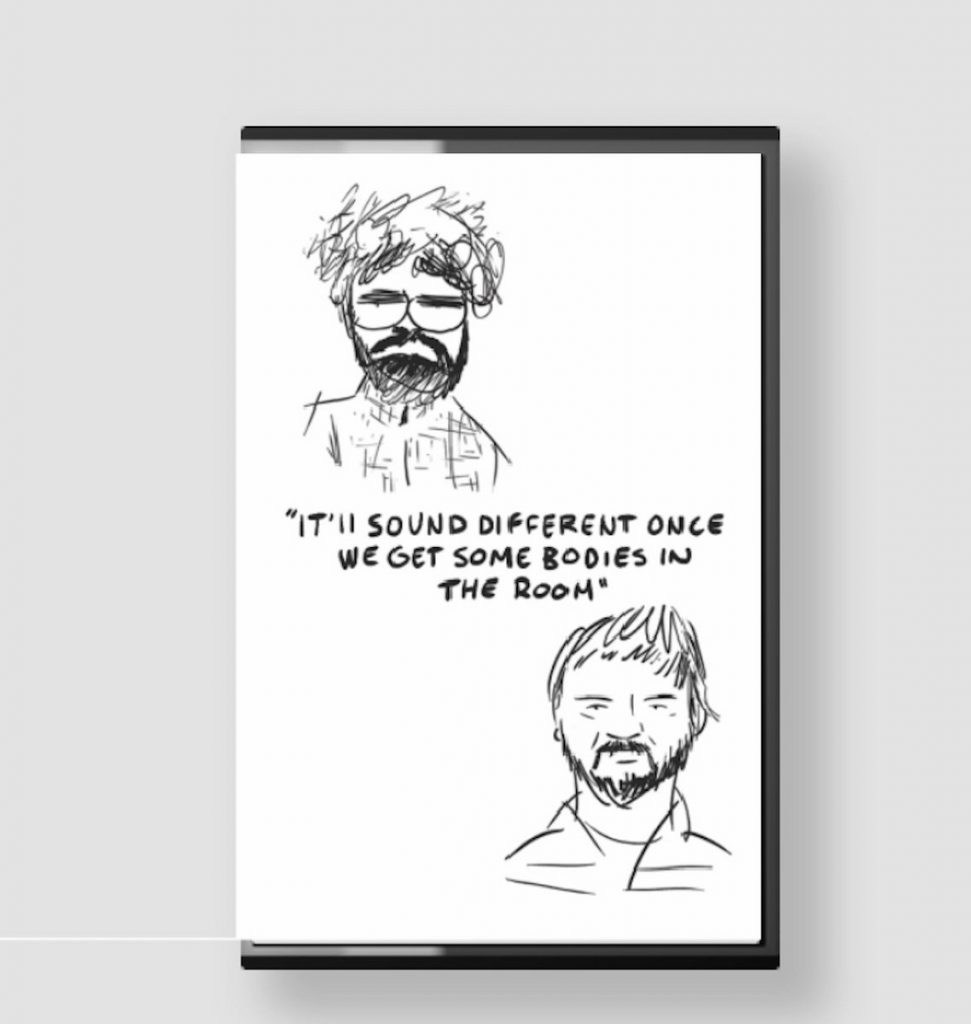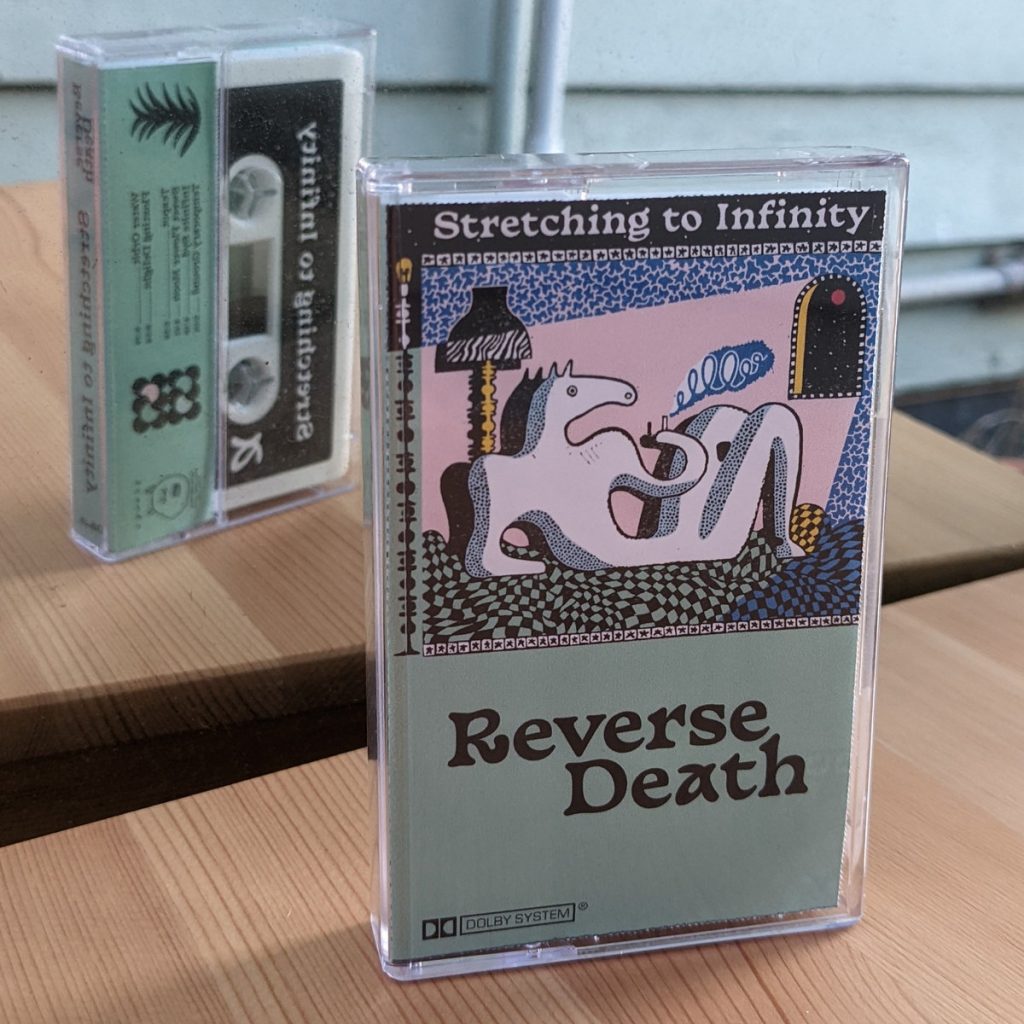What’s Up With Island House?
3.10.23 by Matty McPherson

I’m not on Bandcamp’s Tape Label Report. In my opinion, the whole thing exists as a ghetto to allow a handful of writers to say “wow look at this label” without really ever getting into the meat of the whole thing. It’s publicity for small endeavors, which is always a good thing I believe, although it also feels like you’ve got writers taking a nominal fee to either a) tell you a label with 400 releases is “really cool” (see Marc Masters writing about Already Dead, which seriously dismayed me in how it boiled Muave down to far too few words with a limited perspective) or b) tell you a label with 5 releases and a barely defined aesthetic is “the next big thing.” This is borderline windowshopping “scene celebrates itself” shenanigans I see all the time in San Diego beer journalism, except it is online on the Epic Games owned website that’ll now have a radio station in Fortnite. As such, I rarely feel like i’ve learned anything at the end of the day or found a new salience. Why do these labels being highlighted…matter?
In truth, move beyond my my finger wagging and bellyaching above. If you want to figure why something matters, well you should go out and find for yourself! Such was the case I found myself with Island House. Self-described as “a little label based on a little island in the East river,” run by a cool dad who’s a self-described member of the post-wook revolution and has released to this day…9 releases.
But it is with a light heart that I can say the 9 releases are THAT terrific; against the grain, what Tim McManus is curating has legitimate heat and stakes. He “started [the label] in 2022 at the behest of his guitar teacher and online friends,” which again perhaps explains how Island House probably made some absolutely insane mogul moves so early on. Getting Steve Rosborough of Moon Glyph to do art on your first release is a power play. Having M. Geddes Gengras, Jeff Tobias, and Jen Powers of Astral Editions write liner notes are also huge net gains. He has European Distribution for select titles. At release 5 Island House did a comp where 37.5% of the material was just German Army cuts alongside Andrew Weathers land art + Prana Crafter “going psych mode.” Like pretty much all he needs is just ONE Patrick Shiroishi tape by the year’s end and Island House officially acquires the “American Tape Label Triple Crown Hat Trick” award good mother of god. Maybe Joe WAS right!
Now, I was able to share a lovely phone call with McManus back on Sunday 2/19, as he stepped out of one room where he was staying in the Hudson Valley that weekend, to talk shop about the label. McManus has had quite the past 3 years, both through new fatherhood and slowly taking account of both local rumblings in New York City & the Hudson Valley; he had moved from a tiny apartment in Roosevelt Island out to Harlem when an opportunity for more space presented itself. There were quick, snappy mentions of a new Kent Ave space, 411 not 285, where David Watson’s Shift has taken up space for eclectic arts, as well as the Pit, a space run by Jim McHugh from Sunwatchers. McManus has been going to these shows, clocking names and faces, partially thanks to one extroverted conversation after another started by Zack Hale; all while even jumping into amateur DIY gig booking that included a rather successful donation gig.
McManus’ ties to both the DIY rumblings in NYC and the Hudson have been crucial in garnering the courage and gumption to go deep into his own label. At the moment, Island House would not exist without the immense support and keen ear of people running from those who are booking at the spaces above, Mr. Hale, Ryley Walker, Jeff Tobias, Mike Horn, numerous Twitter mutuals (including one Aquarium Drunkard writer in the city), amongst many others have all played a role in McManus taking the label to this current stage; it’s an era of mutual help and the strength of weak ties being played to its fullest. There’s a wealth of information and resources these folks have tapped into, reinforcing a belief both McManus and myself share, the kind that “any kind of experimental scene that’s not from your normal…that’s where im happy.” McManus is humble though, repeatedly emphasizing during the call “I’m just trying to get the music out there” working with the goodest of good goobers he can afford. CDs may be coming soon, although vinyl is a pipe dream; the expense and sourcing right now is too hard to make the calls for. Oh, and he’s a stay at home dad wrapping up a college degree; I can attest to brief blips of that struggle!
So in 9 releases, as a result of these connections & reception, the label has actually been able to position itself at a stronger advantage than other tape labels I’ve noted. Most notably (and centering everything), there’s the tape j-card art. While the Steve Rosborough design of IH-001, a Seawind of Battery release, was a one-off (planned to be reissued to match the current aesthetic), McManus quickly sought inspiration and design aesthetics from Astral Spirits. As such, Island House quickly sorted out a design that allows for artists to submit their own art, while also keeping a uniform “peachy” label. Such is going to standout, especially when Island House has taken the bold steps to garner European, Australian, South African, and even Japanese distribution in varied capacities (one tape even made it’s way to Palace Music HQ). Tapes down there that quickly? Well, McManus is going a day at a time though, as he considers which release is next on the docket, who’s to pen the liner notes, and just what kind of local community he wants to spring from Island House. The roster right now stands as a result of a web of connections and admiration; for example, it was J. Moss of the Modern Folk who was the one who shepherded that aforementioned compilation to the label for last year. Two releases down the line set for spring are to feature…vocals! McManus is wagering they may have a stronger reach than the instrumental folk sounds the label has chased so far.
As such, it explain how Island House has been able to practically blast off in under 9 months. A wealth of connections, ample good will, and most necessarily, the space and (personal) time to take on this endeavor have given McManus’ label a chip on its shoulder. To me, Island House is the timeless story of DIY being played out in the best of ways: someone realizing they can be their own curator and documenter, using a web of connections to jump into the fray, and going one release at a time. We’ve lost some great labels over the past two years: Ingrown Records had to shut down due to life changes, FTAM finally decided to close up shop as Peter Woods moves across the pond to teach in academia; meanwhile, Garden Portal’s terminal hiatus doesn’t exactly inspire hope for what the Athens, GA maverick’s trajectory is. Yet, what I’ve listed above gives me ample hope that McManus has picked up that torch and will hopefully continue to ignite happenings around the Hudson, NYC, and far around the globe for as long as possible.
Anyways, here’s 3 quickies on the January, February, and March releases.
David Cedolin – Ligurian Pastoral
Genova, Italy-based Davide Cedolin brought Island House into 2023 with Ligurian Pastoral, an acoustic guitar release with the harmonic potency of sounding akin to being nestled up in the guitar. Half a world away, Cedolin has been settling into the Ligurian region, and Ligurian Pastoral is a tribute to that “tight and bent strip of land between the Ligurian sea and the Apennines mountains”; you could call it a mediterranean climate. The 7 cuts are simple instrumentals that unfurl with brilliant grace; a small drone or reverberation here, a touching astral projections from Seawind of Battery on cuts 2 & 7 there, a gorgeous litany of rustic harmonies at every turn. For a Pat Metheny head, you’d probably find a smidgen of jamming here too! Everything works to create a situated response and mapping of Cedolin’s current homestead, while also leaving an incredible amount of space for pondering and considering. This tape is autobiographical after all, refractions of daily routines, faces, and landmarks that words often falter when attempting to explain the gracefulness of; the vibe is something that you make of it. This winter, San Diego county has had a bounty of storms this winter. Ones that which our rapidly disappearing (see the word “aridification”) Mediterranean climate glisten back to life for brief spurts. When I listen to this tape, all I see are outside are a rainbow of greens, my own pastoral that that this tape gives me thanks for.
Emergency Group – Inspection of Cruelty
The quartet of Robert Boston (keys), Andreas Brade (drums), Jonathan Byerley (guitar), and Dave Mandi (bass) sat down on November 2nd, 2022. This is what followed. And what was that exactly? A 46 minute krautjam rock sesh, one held together by motorik drumming and an absolutely free-wheeling sense of open armed love and magic. Of the three releases spotlighted here, Inspection of Cruelty, is the deepest of deep zoning sessions the label has provided to date. The two parts of Inspection of Cruelty are ample enough to work on their own without the connecting piece, yet taken together you have an ample piece that sees each member figure their own aura. Over the course of the 46 minutes, each player is offered ample time to excel at a solo moment as their brethren tune down and lower their instruments either to a one-track mindset or fade out entirely. What results is a fully-fleshed, breathing document of the Emergency Group. In its best moments, Mandi holds down a bass groove, Brade locks into a cymbal rush or lays down a new fill-line, and Boston cranks out key noise or Byerly takes the guitar and wails. Or…they just enter that Autobahn cruise mode where you ride a riff out because it just sounds so goddamn pleasing and flush with flavor. Inspection of Cruelty is not going to create any new krautrockheads, but more or less just confirm how deep of one you already are if you’ve made it this far.
Joseph Allred – For the Fallen Dawn (to be released… soon!)
A tape of acoustic guitar (not quite, there’s more than one stringed instrument)? Takoma school indebted (perhaps, have you seen his CV)? Featuring a poem by Jen Powers (they’re label alum after all)? Are we sure this wasn’t an Astral Edition?! No no! For the Fallen Dawn is a continuation of Joseph Allred’s slick guitar acoustics and natural ambience that have been featured from Garden Portal to Scissor Tail and even Feeding Tube; he’s not exactly a celebrity, although you garner the sense Allred’s style is “discogs bait price” worthy as many of his tapes have become collectables. For the Fallen Dawn has the same pleasure that I found when I was deep into Ross Hammond’s brilliant cassette for Full Spectrum last year. Over 36 minutes, Allred plays to the night sky and ambience of the local crickets and rustling critters in the bushes. 8 cuts are split between 2 modes: short snippets, duets meant to bring in space for the ambience to fulfill and counter, amongst wild sprawling 7-9 minute guitar epics that contain all the stoicism a mighty fine 10 gallon hat can afford. The pleasure are simple and ample, overflowing even as Allred unites strains of country and folk into a sprawling psychedelic vision of his own accord. Ladysthumb and None Are Born or Die are favorites, cunning moments where he launches into an acoustic freakout that sends a jolt to my system.




